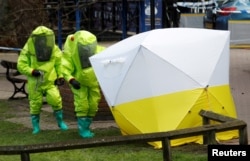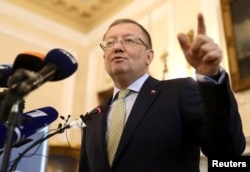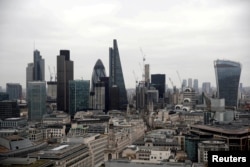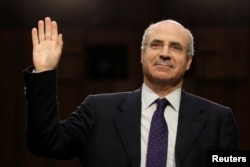His football team won Britain’s prestigious FA Cup Sunday, but Roman Abramovich, the Kremlin-tied Russian oligarch who owns Chelsea football club, is struggling to get his British visa renewed and officials are saying they are still considering his application.
Downing Street declined to comment in detail on Abramovich’s case, but Prime Minister Theresa May’s spokesman told reporters extra checks are being carried out on Russian businessmen applying for investor visas.
Abramovich's visa expired last month. Worth an estimated $13 billion, according to researchers who compile the "Sunday Times Rich List", Abramovich was included for the first time on a U.S. list of Russian officials and oligarchs close to the Kremlin who could be subject to sanctions.
The extra visa scrutiny follows the poisoning earlier this year of former Russian agent Sergei Skripal and his daughter, and came as a House of Commons report complained the British government has been turning a blind eye to the role London's financial center plays in laundering the proceeds of Russian corruption as well as raising money for Russian state-owned companies.
The report warned national security had been put at risk by allowing “kleptocrats and human rights abusers to use the City of London to launder their ill-gotten funds to circumvent sanctions.” And the foreign affairs committee said laxity had allowed money to be put “directly into the hands of regimes that would harm the UK, its interests and its allies.”
The report, titled "Moscow’s Gold: Russian Corruption in the UK", said the government had failed to follow through on Theresa May’s “robust rhetoric” in the wake of the Skripal’s poisoning. “Despite the strong rhetoric, President [Vladimir] Putin and his allies have been able to continue 'business as usual’ by hiding and laundering their corrupt assets in London,” the report said.
Conservative lawmaker Tom Tugendhat, the panel’s chairman, said, “The UK must be clear that the corruption stemming from the Kremlin is no longer welcome in our markets and we will act.”
The report noted that just days after the Skripal's poisoning, and the expulsion of two dozen Russian diplomats following the attempted murder, Russian entities raised $4 billion in eurobonds issuances, half purchased by British investors. The state-owned Russian energy company Gazprom raised more than $800 million in a bond sale in the wake of the Skripal poisoning.
Speaking before the report’s publication Monday, Russian ambassador to London Alexander Yakovenko complained lawmakers were basing too much of what they had to say on guilt by association. “We believe that statements like ‘someone is a friend of somebody’ is not the legal basis for taking decisions against someone.” He said Russian citizens based in London “could go to the courts and put certain things in front of the courts ... and the government should think twice.”
A British government spokesman said there had been an 84 percent drop in investor visa applications in 2014-15 when extra checks were introduced to make sure funds “had not been obtained unlawfully.”
Lawmakers have been urging the ruling Conservative government to block the Kremlin and its allies from using the London financial markets. But Kremlin critics warn banks and investment houses have been lobbying to try to blunt any crackdown.
In an interview with VOA in March, Bill Browder, the American-born financier who was instrumental in persuading Congress to pass the Magnitsky Act, a measure enabling Washington to withhold visas and freeze financial assets of Russian officials thought to be corrupt or human rights abusers, warned of Russian-funded counter-lobbying.
“You can bet that anyone who is making money off Russia is doing their best to keep things calm here in Britain,” he said when discussing the Skripal poisoning.
Browder, who ran one of the most successful investment funds in Russia before his expulsion in 2005 when his business was expropriated, lobbied hard for U.S. sanctions to be introduced after his lawyer Sergei Magnitsky was arrested and died in Russian custody. “Britain has gigantic leverage. All the Russians, members of Putin’s regime, come to London. They buy expensive property, they open bank accounts here, they send their kids to private schools, and so the easiest thing to do is seize their properties and ban their travel and that of their family members, ” he said.
British government ministers insist they will target rich Russians in Britain who can't prove where their money comes from, and they have announced new asset-seizure powers known as unexplained wealth orders. Critics say as a further step, the government needs to insist Caribbean tax havens tied to Britain introduce rigorous transparency rules.
The Kremlin on Monday criticized the delay in renewing Abramovich’s visa, saying Russian businesses “often encounter unfriendly and unscrupulous actions.”















